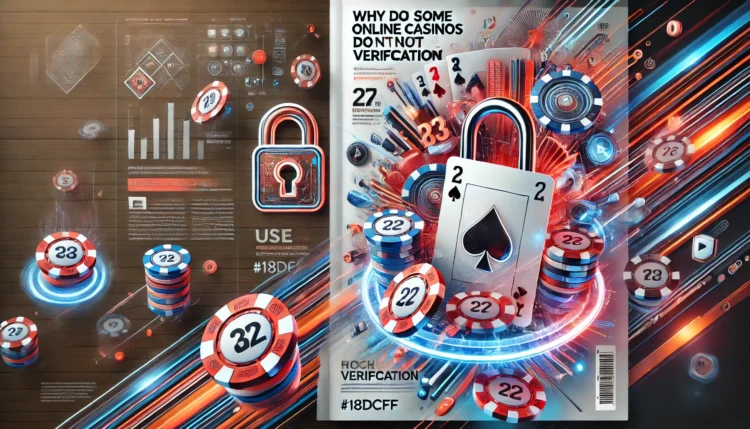Online casinos have surged in popularity over the past decade, drawing in millions of players globally. These platforms offer a wide range of games, from classic slots and table games to live dealer experiences, all accessible from the comfort of one’s home. A notable trend within this space is the emergence of online casinos that do not require verification. This article delves into the reasons behind this trend, its implications, and essential considerations for players choosing such casinos.
The allure of online casinos with no verification is undeniable for many players. Traditional online casinos often necessitate a comprehensive verification process, requiring personal documents like a driver’s license, passport, or utility bills. This process can be time-consuming and intrusive, leading to frustration among players eager to start gaming immediately.
A primary attraction of no-verification casinos is the convenience they offer. These platforms enable players to start playing almost immediately after signing up, without waiting for document verification. This swift access is particularly appealing to casual gamers who seek a hassle-free experience. Privacy concerns also drive the popularity of these casinos. In an era where data breaches and identity theft are prevalent, many players are hesitant to share personal information online. Online casinos that forgo verification provide a level of anonymity highly valued by privacy-conscious individuals. By avoiding the submission of sensitive documents, players can protect their identities and mitigate the risk of information misuse.
From the operators’ perspective, not requiring verification can attract a broader audience. Many potential players are deterred by the cumbersome verification process and may opt not to register with a casino that mandates it. By eliminating this barrier, online casinos can expand their user base, appealing to players who prioritize speed and privacy.
While the benefits of no-verification casinos are evident, it is crucial to understand the potential risks and challenges associated with these platforms. Players should be aware of the trade-offs involved and make informed decisions when selecting where to play. One primary concern with no-verification casinos is the potential lack of regulation. Verification processes often ensure compliance with legal and regulatory requirements aimed at preventing fraud, money laundering, and underage gambling. Casinos that bypass these checks may operate in jurisdictions with looser regulations, raising questions about their legitimacy and the safety of players’ funds.
The absence of a verification process can also pose security risks. Verification helps confirm that the person creating an account is who they claim to be, reducing the likelihood of identity theft and account hijacking. Without this layer of security, players may be more vulnerable to fraudulent activities, and resolving disputes can become more challenging.
Cryptocurrency has significantly influenced the rise of online casinos that do not require verification. Digital currencies like Bitcoin and Ethereum offer a level of anonymity that aligns with the no-verification model, providing players with a secure and private way to deposit and withdraw funds. Cryptocurrencies enable anonymous transactions, allowing players to fund their casino accounts and withdraw winnings without revealing their identities. This aligns perfectly with the ethos of no-verification casinos, providing an added layer of privacy and security for players.
In addition to anonymity, cryptocurrencies offer faster payment processing times compared to traditional banking methods. Deposits and withdrawals using digital currencies can be completed almost instantly, enhancing the overall convenience for players who prefer no-verification casinos. Traditional payment methods often come with various fees, including transaction fees and currency conversion charges. Cryptocurrencies typically have lower transaction costs, making them an attractive option for players looking to maximize their gaming budget. This cost-effectiveness further contributes to the appeal of no-verification casinos.
Cryptocurrencies offer enhanced security features, making transactions more secure compared to traditional payment methods. The decentralized nature of blockchain technology reduces the risk of hacking and fraud, providing an additional layer of protection for players’ funds. Cryptocurrencies are not bound by geographical limitations, allowing players from different parts of the world to participate in online gambling without the constraints of local banking systems. This global accessibility expands the reach of no-verification casinos and attracts a diverse player base.
Given the potential risks associated with no-verification casinos, players must exercise due diligence when selecting a platform. Online casino review sites can be invaluable resources in this regard. These sites evaluate casinos based on several criteria:
Even if a casino does not require verification, it should still operate under a valid gaming license from a reputable jurisdiction. Licensing ensures that the casino adheres to specific standards of fairness and security, providing a level of assurance for players. Review sites research the reputation of casinos by checking ratings from other players. Reputable casinos are more likely to offer a safe and enjoyable gaming experience, even without the verification process. These sites often aggregate user feedback and expert opinions to give a comprehensive view of a casino’s trustworthiness.
While no-verification casinos may not require personal documents, they should still implement robust security measures to protect players’ accounts and funds. Casinos that use SSL encryption and other advanced security technologies provide a safer environment. Reliable customer support is essential, especially when dealing with casinos that do not require verification. Platforms that offer responsive and helpful support channels can address any issues or concerns that may arise, ensuring a smoother gaming experience.
Even without verification, casinos should promote responsible gambling practices. Features such as deposit limits, self-exclusion options, and access to resources for problem gambling are crucial for ensuring a safe gaming environment.






